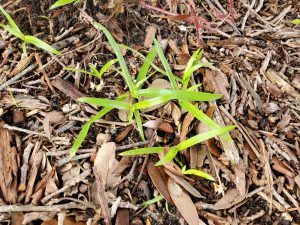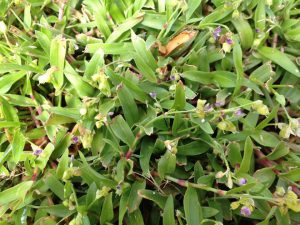If you’ve taken care of your yard properly from spring green-up to now (mid-July), you might think you can comfortably coast into the cool temperatures of fall without any problems. You would be mostly right, save for one extraordinarily tough weed that waits until the depths of summer to rear its troublesome head: Doveweed (Murdania nudiflora).
Doveweed is an insidious invader of Panhandle lawns. In the Panhandle, Doveweed germinates (sprouts) long after most other summer annual weeds, from late May-June when soil temperatures reach ~70°F. This allows it to sneakily avoid spring pre-emergent herbicide applications and even early summer post-emergent applications that target common weeds like Florida Pusley, Spurge species, and others. Doveweed also looks an awful lot like many of our common lawn turfgrasses, especially Centipede and St. Augustine Grass. It possesses thick, shiny, grass-like foliage and even grows in a spreading, low to the ground fashion. This mimicry causes many homeowners to not realize there is a problem until it’s too late. Once Doveweed is mature and displaying its characteristic purple flowers, it is very difficult to control. Finally, Doveweed is extremely tough and aggressive, particularly thriving in moist areas of the lawn. In these areas, Doveweed can easily outcompete the desirable turfgrass and, without intervention by you, will soon have the whole lawn to itself.
Controlling Doveweed is no easy task and requires a combination of practices to keep it out of your lawn. The first line of defense against any weed, Doveweed included, is through proper cultural practices. In turfgrass lawns, this means ensuring that you mow your lawn regularly and at the proper height (2.5” or so for Centipedegrass), keeping the lawn irrigated during droughty periods, fertilizing based on a soil test, etc. Being diligent in the above tasks will go a long way to ensuring that your turfgrass is healthy and better able to ward off a Doveweed invasion. However, even when homeowners maintain their turf perfectly, chemical herbicides are usually required to keep Doveweed at bay.
While many commonly used homeowner herbicides are not effective on Doveweed, there are several quality options at your disposal.
- Doveweed is most easily controlled with preemergent herbicides, specifically one of the following: Atrazine, Pennant Magnum (S-metolachlor), Tower (dimethenamid), and Specticle (indaziflam). The issue with pre-emergents is that most folks shelve them after spring application in February or March. Since these products lose their efficacy after 4-6 weeks, Doveweed’s emergence in May is undeterred. To obtain control on Doveweed with these products, split the spring application and apply once in late Feb/early March and again in mid-late April.
- Doveweed can also be controlled by post-emergent herbicides after it is up and growing, though multiple applications may be required. The most effective formulations contain a combination of 2,4-D or Dicamba and other herbicides. While most of these products have at least fair efficacy on Doveweed, stronger, more expensive products like Celsius, Tribute Total and others provide better results.
- If Doveweed has already displaced turfgrass in large areas of your lawn, you may unfortunately be better off to make an application of a non-selective herbicide like glyphosate (Roundup), kill out the entire area of infestation and start over by resodding.
While Doveweed is a major problem in Panhandle lawns, it doesn’t have to be in yours! By keeping your turf healthy with proper cultural practices and making timely applications with effective herbicides, your lawn can be a Doveweed free zone! For assistance in Doveweed identification in your lawn, help choosing herbicides and calculating application rates, or any other horticultural information, contact us at the UF/IFAS Calhoun County Extension office! Happy Gardening!
- Mulch is a Must in Your Landscape - December 4, 2025
- Tis the Season – Why Winter is the Best Time to Plant Trees and Shrubs - November 26, 2025
- Feeling Blue (Ginger) This Fall - November 13, 2025


